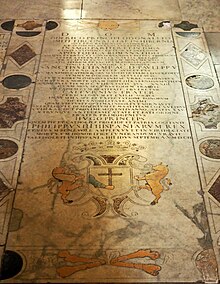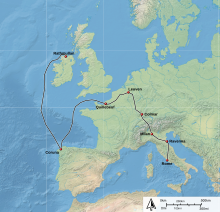Cathbarr O'Donnell
Cathbarr O'Donnell Cathbarr Ó Domhnaill | |
|---|---|
 Tomb of Cathbarr and his brother Rory in San Pietro in Montorio | |
| Born | c. 1583 Tyrconnell, Ulster, Ireland |
| Died | 15 September 1608 (aged about 25) Rome, Papal States |
| Father | Hugh McManus O'Donnell |
| Mother | Iníon Dubh |
Cathbarr O'Donnell (Irish: Cathbarr Ó Domhnaill; c. 1583 – 15 September 1608) was an Irish nobleman and member of the O'Donnell dynasty of Tyrconnell. The youngest brother of Red Hugh O'Donnell, Cathbarr fought in the Nine Years' War. He married Rosa O'Doherty, sister of Cahir O'Doherty.
In 1607 Cathbarr took part in the Flight of the Earls, leaving Ireland for mainland Europe. He settled in Rome but shortly afterwards died of a fever.
His name is often anglicised as Caffar.[1] It is latinised as Calfurnius on his tomb inscription.
Family background
[edit]Born c. 1583,[2] Cathbarr was the fourth and youngest son[3][4] of Sir Hugh McManus O'Donnell, an Irish Gaelic lord who ruled Tyrconnell from 1566 to 1592. His mother was Hugh McManus's Scottish second wife, Iníon Dubh.[1] His older brothers were Hugh Roe (Lord of Tyrconnell, 1592–1602),[5] Rory (Earl of Tyrconnell, 1602–1608)[6] and Manus (died 1600).[7] He also had several sisters, including Nuala, Mary and Margaret.[4]
Nine Years' War
[edit]His elder brother Hugh Roe was a key confederate leader during the Nine Years' War (1593–1603).[5] Cathbarr and his brothers supported Hugh Roe during the war. In 1599 he fought alongside his brothers at the Battle of Curlew Pass, which resulted in a crucial victory for the Irish confederacy. In 1601 he accompanied them on the march to Kinsale in County Cork,[1] where Spanish reinforcements had arrived.[8][9] Cathbarr fought at the Siege of Kinsale[1] where the confederacy faced a crushing defeat.[9] After the battle he returned to Lower Connacht with Rory.[1] Despite attempts to recover the military initiative, the confederacy was severely weakened. Hugh Roe died in September 1602 and Rory surrendered to the Crown at Athlone in December.[6]
Marriage
[edit]Sometime before 1605, Cathbarr married Rosa O'Doherty.[1] Rosa was a daughter of Sean O'Doherty, Lord of Inishowen.[10] Rosa's brother Cahir O'Doherty defected to the Crown's side during the war but later launched O'Doherty's Rebellion by burning Derry.[11]
Flight of the Earls
[edit]In 1607, Cathbarr and Rosa accompanied Rory in the Flight of the Earls to Continental Europe.[12]

Death and burial
[edit]In early July 1608, Cathbarr travelled to Ostia, a coastal town fifteen miles west of Rome, in order to "make holiday and take a change of air". He was accompanied by his brother Rory, Hugh O'Neill, 4th Baron Dungannon, and Donal O’Carroll, Vicar General of Killaloe. Unfortunately, the men "all agreed that that particular place [was] one of the worst and most unhealthy for climate in all Italy". Rory died of fever on 28 July 1608.[13] Cathbarr also became ill, and similarly died of fever on 15 September 1608 in Rome.[1][14] He is buried in San Pietro in Montorio.[13]
Legacy
[edit]The leadership of the O'Donnells passed to Rory's young son Hugh Albert O'Donnell.[12]
After Cathbarr's death, Rosa remarried to the Irish soldier Owen Roe O'Neill.[15]
Cathbarr had a son with Rosa named Hugh O'Donnell, who was aged two years and three months at the time of the Flight of the Earls in September 1607. This puts Hugh's birthdate around June 1605.[16] Hugh became a Captain in the Spanish Army, serving in his stepfather's regiment in Flanders. He was killed in 1625 during the Siege of Breda.[17][1]
Cathbarr also had an illegitimate son, named Conn, with another woman. According to Darren McGettigan, Conn was born with six toes on one foot.[1] According to Francis Martin O'Donnell, it was Cathbarr's son Hugh who had six toes on one foot.[18] In 1608 Sir John Davies stated that the O'Donnell family had high hopes for Conn "for they affirm that one of their saints of Tyrconnell hath prophesied that when such a one, being of the sept of O'Donnell, shall be born, he shall drive all the Englishmen out of Ireland". Conn was raised in the household of Lord Deputy Henry Cary, 1st Viscount Falkland.[1] Conn was also raised by Captain Basil Brooke at Donegal Castle.[19] He was later imprisoned in a London prison, and then in 1629 escaped to Flanders alongside his cousins Mary Stuart O'Donnell and Hugh O'Rourke.[1]
Family tree
[edit]|
Issue of Hugh McManus O'Donnell (Aodh mac Maghnusa Ó Domhnaill; c. 1520 - 1600), son of King of Tyrconnell Manus O'Donnell (Maghnas Ó Domhnaill), and Judith O'Neill (Siobhán Ó Néill). First marriage: Nuala O'Neill[i]
Second marriage, 1569: Fiona MacDonald (Fionnghuala Nic Dhomhnaill, also known as Iníon Dubh), daughter of James MacDonald, 6th of Dunnyveg and Agnes Campbell.
|
Notes
[edit]References
[edit]Citations
[edit]- ^ O'Donnell 2018. Francis Martin O'Donnell names Sir Hugh's first wife as "Nuala, a daughter of O’Neill".
- ^ a b Walsh 1922, p. 362.
- ^ Ó Domhnaill 1952, p. 87. The historicity of this person is disputed.
- ^ a b c O'Donnell 2020, p. 7.
- ^ O'Donnell 2006, p. 37
- ^ a b O'Donnell 2020, p. 7. Francis Martin O'Donnell believes that Margaret was the widow of Teigue O'Rourke.
- ^ O'Donnell 2006, p. 38.
- ^ Walsh 1922, p. 361–362. Walsh believed that the sister married to Teigue O'Rourke was neither Mary nor Margaret.
- ^ a b O'Donnell 2006, p. 38. Gráinne and Meadhb are known only as sisters of the Earl (i.e. Rory), with no additional information.
- ^ a b c d e f g h i j k McGettigan, Darren (October 2009). "O'Donnell, Caffar". Dictionary of Irish Biography. doi:10.3318/dib.002288.v1.
- ^ Concannon 1920, p. 218.
- ^ O'Clery, O'Clery & Murphy 1895, p. 3.
- ^ a b McGettigan 2005, p. 36
- ^ a b Morgan, Hiram (October 2009). "O'Donnell, 'Red' Hugh (Ó Domhnaill, Aodh Ruadh)". Dictionary of Irish Biography. doi:10.3318/dib.006343.v1. Archived from the original on 25 July 2021.
- ^ a b O'Byrne, Emmett (October 2009). "O'Donnell (Ó Domhnall), Ruaidhrí". Dictionary of Irish Biography. doi:10.3318/dib.006701.v1. Retrieved 15 April 2024.
- ^ Concannon 1920, p. 232.
- ^ McNeill 1911, p. 110.
- ^ a b McGurk, John (2001). "The Battle of Kinsale, 1601". History Ireland. 9 (3). Archived from the original on 4 March 2024.
- ^ Casway, Jerrold (2009). "O'Doherty, Rosa". Dictionary of Irish Biography. doi:10.3318/dib.006685.v2. Retrieved 27 December 2024.
- ^ McGettigan, Darren (October 2009). "O'Doherty (Ó Dochartaigh), Cahir". Dictionary of Irish Biography. Royal Irish Academy. doi:10.3318/dib.006684.v1. Retrieved 2 December 2022.
- ^ a b Casway 1984, p. 25.
- ^ a b FitzPatrick, Elizabeth (August 2007). "San Pietro in Montorio, burial-place of the exiled Irish in Rome, 1608-1623". History Ireland. 15 (4). Archived from the original on 1 March 2024.
- ^ Walsh 1930, p. 58.
- ^ Casway, Jerrold (2009). "O'Doherty, Rosa". Dictionary of Irish Biography.
- ^ Annals of the Four Masters: "[Flight of the Earls, September] 1607: ...Rose, the daughter of O'Doherty, and wife of Caffar, with her son, Hugh, aged two years and three months..."
- ^ Casway 1984, pp. 27–28.
- ^ O'Donnell, Francis Martin (1 January 2020). "Memorialising Emigré Dignity - The Cultural Heritage of St. Anthony's College, Leuven". Irish College Leuven - Memorialising Emigré Dignity - The Cultural Heritage of St. Anthony's College, Leuven.
- ^ O'Donnell 2006, p. 37.
Sources
[edit]- Casway, Jerrold (1984), Owen Roe O'Neill and the Struggle for Catholic Ireland, University of Pennsylvania Press
- Concannon, Helena (1920). "'The Woman of the Piercing Wail' (The Lady Nuala O'Donnell)". The Irish Ecclesiastical Record. 16. Dublin: John F. Fowler.
- McGettigan, Darren (2005). Red Hugh O'Donnell and the Nine Years War. Dublin: Four Courts Press. ISBN 978-1-8518-2887-6. OL 11952048M.
- This article incorporates text from a publication now in the public domain: McNeill, Ronald John (1911). "O'Neill". In Chisholm, Hugh (ed.). Encyclopædia Britannica. Vol. 20 (11th ed.). Cambridge University Press. pp. 107–111.
- O'Clery, Lughaidh; O'Clery, Cucogry; Murphy, Denis (1895). Beatha Aodha Ruaidh ui Dhomhnaill. The life of Hugh Roe O'Donnell, prince of Tirconnell (1586-1602). Boston College Libraries. Dublin, Fallon.
- O'Donnell, Eunan (2006). "Reflection on the Flight of the Earls" (PDF). Donegal Annual (58): 31–44.
- Walsh, Paul (1930). Walsh, Paul (ed.). THE WILL AND FAMILY OF HUGH O NEILL, EARL OF TYRONE [WITH AN APPENDIX OF GENEALOGIES] (PDF). Dublin: Sign of the Three Candles.
Further reading
[edit]- McCavitt, John (2002). The Flight of the Earls. Gill & MacMillan.
